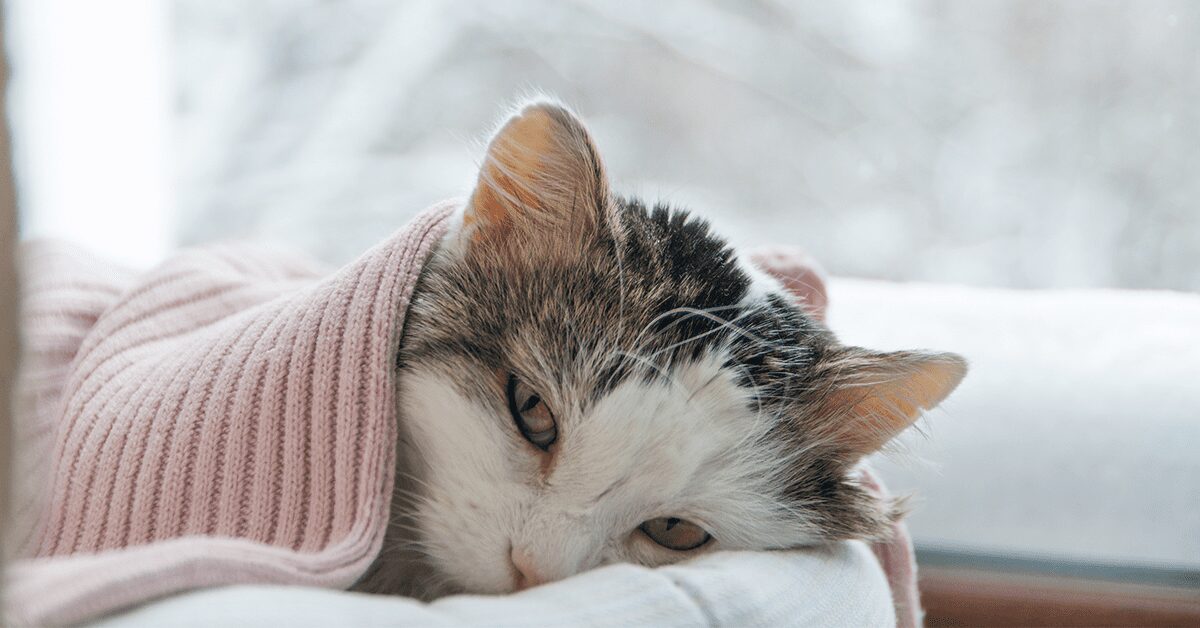Key Points
- Diarrhea in cats can have many causes – from stress and food intolerance to parasites and disease.
- Contact your vet if there’s no easily identifiable cause for your cat’s diarrhea, especially if your cat is vomiting and appears dehydrated.
- Treatment can include diet change, medication, surgery, or other methods, depending on the cause.
If you notice some loose poop in your kitty’s litter box every once in a while, it’s probably no big deal. But if loose bowel movements keep happening over and over again, it’s only natural to stop and wonder: Why does my cat have diarrhea?
Let’s get to the bottom of it.
Symptoms
Diarrhea is usually no big deal, but other times, it can be cause for concern. The answer typically lies in whether it’s acute or chronic. Acute diarrhea happens suddenly, whereas chronic diarrhea lasts for two weeks or longer and usually points to a much deeper problem. Call your vet if your cat’s diarrhea persists longer than 24 hours or if they’re also vomiting.
Causes
Knowing the cause of your cat’s diarrhea will help you appropriately care for them and decide when it’s time to see a veterinarian.
According to Dr. Jamie Whittenburg (DVM), a veterinarian at Cat World and director of Kingsgate Animal Hospital, these are some common causes for cat diarrhea:
- Dietary changes
- Parasites
- Stress
- Bacterial infections or viral infections
- Ingesting foreign objects or toxic substances
Let’s take a closer look at these common causes of cat diarrhea:
Dietary changes: It’s always a good idea to ask your vet what foods are best for your cat, especially if your feline friend is experiencing recurring diarrhea. If you’re changing your cat’s food type, transition slowly so your cat’s sensitive stomach can get used to the change. Introducing new foods slowly over several weeks can also help you monitor for food allergies or intolerances. Watch out for other allergic reaction symptoms in your cats, like loss of appetite, vomiting food, or swelling. Your vet is a great resource to lean on during this process.
Parasites: Intestinal parasites are a prevalent intestinal problem for cats. Common parasites include roundworms, hookworms, tapeworms, giardia, and coccidia. All of these are transmitted via poop – which is a great reason to clean your kitty’s litter box regularly.
Signs of worms include:
- Distended belly
- Abnormal coat
- Thin appearance
- Lethargy
- Worms visible in poop
If you suspect your cat has worms, your vet will need a stool sample to check. To stop worms before they start, talk to your veterinarian about worm prevention.
Stress: Much like humans, every cat has a different way of responding to stress. Some cats may be stressed out by new people, new experiences, other animals, loud noises, or moving locations. Whatever the cause, stress can affect your cat’s digestive system. If your cat seems afraid or uncomfortable or you’re going through a big life transition, this may be the culprit.
Ingesting foreign objects and allergens: Cats are hunters, and their stomachs may not always agree with what they find. Whether that’s a rodent, toy, or piece of trash, ingesting something they shouldn’t can cause diarrhea. Make sure to kitty-proof your house, and keep human foods and any toxic plants and away from your cat.
Tip: If you suspect your cat has ingested an object or toxic substance, contact your vet immediately. The Pet Poison Helpline is also a helpful emergency resource.
Bacterial or viral infections: Stomach infections like salmonella and E. coli cause severe diarrhea and dehydration that can very quickly escalate to organ damage. Other symptoms of infections include vomiting, pale gums, lethargy, abdominal pain, and fever. If you notice these signs, contact your veterinarian.
Diagnosis
Cat diarrhea can be caused by any of the reasons listed above. In addition, serious diseases such as diabetes, hyperthyroidism, and intestinal lymphoma are less common causes of diarrhea that may affect your cat at some point in their lifetime.
In general, Dr. Whittenburg recommends calling a veterinarian any time there is no easily identifiable cause for your cat’s diarrhea, especially if the diarrhea is accompanied by additional symptoms.
“Weight loss, fever, lethargy, and hiding are additional signs that your cat requires immediate veterinary attention,” says Dr. Whittenburg. Untreated gastrointestinal issues can lead to chronic illnesses like inflammatory bowel disease or life-threatening conditions like hepatic lipidosis. “The sooner an accurate diagnosis is made, the sooner the issue can be treated,” she emphasizes.
What to expect at the vet’s office
When you talk to your vet, they will likely ask about the consistency and color of your cat’s poop. Cat poop is supposed to be malleable and brown. Soft poop can happen from time to time, but liquid diarrhea is especially concerning as it can quickly dehydrate your cat.
The most concerning poop colors to watch out for are yellow, red, and black. Yellow feces can be a sign of liver disease, anemia, or poisoning. Red and black diarrhea is a sign of internal bleeding. Your vet will need to perform tests to make that determination.
Tell your vet if your cat’s diarrhea is runny, bloody, yellow, coated in mucus, accompanied by vomiting, or persists for more than 24 hours. You should also tell your vet if you have a kitten, a pregnant cat, or a cat with a known chronic disease.
Treatment
Treatment will vary from cat to cat. Once your vet understands possible causes for what’s happening, they can perform tests, diagnose your cat, and start treating the cause of your cat’s diarrhea.
Recovery and care
If your vet suggests managing diarrhea from home, give your cat lots of water to replace the fluids and electrolytes they have lost from diarrhea. If your cat is unable to retain water, your veterinarian may need to provide your cat with subcutaneous fluids.
Your vet can also recommend changes to your cat’s diet that may help with recovery. This could mean taking a break from food for part of a day, easing back into food with a bland diet, or offering your cat supplements like probiotics or canned pumpkin. If diarrhea continues, keep talking with your veterinarian until you find a solution that works.
Prevention
Not all diarrhea is preventable, but regular checkups with your vet are a great place to start. Regular vaccinations, deworming medicine, and cleaning your cat’s litter box can help prevent parasitic infection.
When your cat becomes unexpectedly ill, you want to get them the best care possible. That’s why all Pumpkin Cat Insurance plans give you the option for 90% cash back on eligible vet bills: so you can worry less about the cost, and more about your cat’s care.
The bottom line
Diarrhea in cats can be caused by a variety of factors or conditions. It’s important to take your feline friend to the vet when you notice loose poop and don’t know the cause – the sooner you do, the sooner they’ll be on the road to recovery.
FAQs
How serious is diarrhea in cats?
In some cases, diarrhea in cats may be caused by a one-time incident, like eating a toy that was left lying around the house. However, diarrhea can also indicate an underlying health condition, which is why it never hurts to take your cat to the vet for further investigation.
What can I feed my cat to help with diarrhea?
High-fiber and high-protein foods can help alleviate diarrhea in cats. Be sure to consult your vet for specific dietary recommendations tailored to your feline friend.
Did you know?
- Certain house plants are toxic to cats and can cause diarrhea – so it’s important to keep them away from your feline friend!
- Poop color can tell you a lot about your cat’s health, so be alert to any sudden changes and contact your vet if something seems off.




